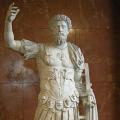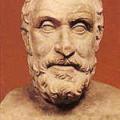68 - John Sellars on the Roman Stoics
Posted on
Peter chats about Seneca, Marcus Aurelius, and Epictetus with John Sellars, an expert on Roman Stoicism and the reception of Stoicism in the early modern era.
Themes:
Further Reading
• J. Sellars, The Art of Living: The Stoics on the Nature and Function of Philosophy (Aldershot: Ashgate, 2003).
• J. Sellars, Stoicism (Berkeley: University of California Press, 2006).
• J. Sellars (ed.), Justus Lipsius: On Constancy (Exeter: Bristol Phoenix Press, 2006).
• J. Sellars, "Stoic Practical Philosophy in the Imperial Period," in Greek and Roman Philosophy, 100 BC-200 AD, ed. R. Sorabji and R.W. Sharples (London: Institute of Classical Studies, 2007), 115-40.







Comments
John Sellars
Excellent! I hope we'll hear more from John later in the series. As it happens I had just got his "Stoicism", which I finished reading tonight. As lucid as an Adamson podcast and just as packed with insight. I shall be reading it again shortly because there must be a lot I did not absorb. One of the books he mentions is Becker "A New Stoicism" and I wondered if anyone had read it and could comment on it.
Now I've got to get "The Art of Living".
In reply to John Sellars by Ollie Killingback
John Sellars
Dear Ollie,
Thanks, I'll pass this on to him! Maybe I can get him to comment more on the Becker book, I haven't read it myself.
Peter
Stoic Reader
Hi Peter,
I don't know if someone has already asked this, but I wonder if you could suggest one or more readers for Stoic thinkers other than the big three. Is there a book you recommend that would contain some or all of the fragments from these lesser known Stoics?
If I may, I also wanted to suggest the following: if you could possibly recommend more primary sources (books, excerpts, or fragments by the original philosophers) in your "further reading" lists, I think many people including myself would greatly appreciate it.
Regards,
Ron
In reply to Stoic Reader by Ron
Reading suggestions
Hi Ron,
Yes, I'm trying to put primary readings in (English) translations on the further reading lists too, they are also on the "top page" for each section (like here and on the similar top pages for the Pre-Socratics, Plato and Aristotle). That would be relevant here, because the early Stoics are best collected in the Long and Sedley reader. I'm not aware of an easily accessible reader that covers fragments from Roman Stoics but if someone else is I would love to know! I think that for the "famous" Roman Stoics you should get a hold of complete works, since that is the best way to read them anyway.
By the way I will be supplying more in the way of recommendations for primary texts once we get into later antiquity where I am usually going to be covering one author per episode rather than whole schools, as in the Hellenistic period.
Hope that helps a bit,
Peter
r/stoicism interview with John Sellars
Hi Peter, thanks for the tweet earlier today to our interview with John over at reddit: http://redd.it/tgjxf (in case anyone else wants to check it out).
We are very grateful to John for answering our questions, and I have to say we have come full circle since I was introduced to him through this interview with you, and I was introduced to HoPWaG by a post on reddit. Feel free to stop by and join our discussions, it's free and takes about 30 seconds to create a username. I have been recommending your podcast on all the philosophy subreddits (like r/philosophy) and people have been very impressed. Keep up the great work!
Cheers,
M
In reply to r/stoicism interview with John Sellars by miyatarama
Reddit
Thanks very much! I'm sure a lot of listeners will want to check out the discussions.
in about 5 years or so
I keep going back and listening to older podcasts in the series and ironically in this one, you mentioned you'd get to Descartes in about 5 years or so. I imagine you were wondering about that statement at the time. Well, 8 years on and we're still (blissfully) enjoying the Renaissance. (and two other parallel series are also being produced...) I'm almost hoping it takes another two years for you to make it to Descartes and another 10 to get to Hume. Happy New Year.
In reply to in about 5 years or so by Dave Lavery
5 year plan
Oh yeah, I slightly missed that deadline didn't I! I think back then I didn't know yet I'd be branching out to India and Africana but even so I guess that was overoptimistic.
Happy New Year to you too!
A response to maximizing happiness
Did I just hear the conversation claim that Stoicism was a response to the debauchery of Epicureanism, i.e. their primacy towards maximizing happiness? Are we to broadly infer from history that a moral philosophy grounded in maximizing happiness will inevitably lead to self interested immoral harms towards others, and therefore morality grounded in such a primacy is misguided and not actually grounded in the good after all? On one hand it seems that in this narrative stoicism may be a response to the immoral harms on society from such epicurean debauchery, while on the other hand it could also be a psychological attempt at self preservation by cultivating inner strength and self control in the face of chaotic extremes in society, e.g. “When, then, have I told you that my head alone cannot be cut off?” -Epictetus.
In reply to A response to maximizing happiness by TB
Stoicism and Epicureanism
I don't remember what exactly was said in this interview (it was a long time ago!) but I don't think Stoicism emerged as a response to Epicureanism. It was initially more inspired by Plato, I think, and by Socrates. But certainly Stoicism was in competition with Epicureanism for a long time, since they emerged almost simultaneously and were the two most successful "dogmatic" (i.e. non-skeptical) Hellenistic schools.
Add new comment